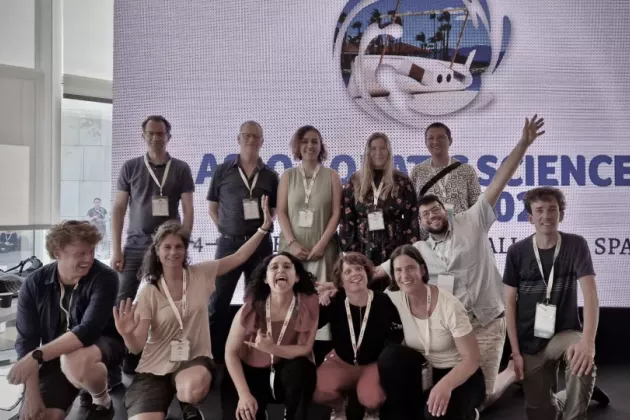Climate research

We conduct advanced research on the climate – exploring what affects it, historical patterns, biosphere-atmosphere interactions, and what we can expect in the future with a changing climate.
The effects of climate change are already becoming apparent: average global temperatures are rising, ice is melting and sea levels are rising. All aspects of life are being affected. Conditions for people and the planet are changing at a fundamental level.
More research perspectives are needed
We need to improve our understanding of the climate system and identify areas where our knowledge is limited, even though we already have sufficient knowledge to reduce emissions and adapt society to climate change. This is particularly important if we are going to be able to predict, manage and mitigate the consequences of climate change.
Researchers in this area are studying, for example:
- the climate system from many different perspectives, so that we can better understand and address climate-related issues. There are strong links between the climate and other major global issues such as poverty reduction, air pollution, biodiversity loss and economic growth
- the climate’s natural variation, how and why it changes over time, and how sensitive the climate system is to change
- the impact of climate change on biodiversity and ecosystems
- the physical processes in the atmosphere, land, ecosystems, oceans and ice that are important for carbon, water and other cycles. Knowledge of this is essential in order to develop more reliable climate models and to understand how the climate will react to, for example, increased emissions and changes in land use.
Improving climate models through collaboration
The research environment MERGE brings together researchers from five Swedish universities and the Rossby Centre (SMHI) to develop global and regional climate models that describe different processes in the climate system. The advanced models make it possible to study interactions between the physical properties of the atmosphere, land surface, ecosystems, oceans, lakes and ice.
Application areas
Researchers generate innovations and knowledge in close collaboration with national and international experts, industry, the public sector and other societal stakeholders. A key objective of MERGE is to improve the relevance of climate models to society, so that research and its results can be applied in practice. This includes:
The research provides public sector and industry decision-makers with evidence-based and detailed knowledge on emissions reduction topics.
This knowledge can help them better understand the impact of emissions on the environment, as well as contribute to methods and strategies for reducing them. This can lead to better decisions and more effective measures in reducing greenhouse gases and environmental protection.
Researchers help us understand how land use and vegetation impact air quality and the climate.
This knowledge enables industry, the public sector and other stakeholders in society to gain important insights, such as how to conserve and manage forests in ways that contribute to reduced climate emissions and cleaner air.
Research and calculations on how the climate and our ecosystems might be affected in the future are particularly important if we are to adapt our societies to climate change.
This knowledge can be used to support decisions on reducing emissions, improving climate preparedness and proposing climate action. This research is used, for example, by the UN's Intergovernmental Panel on Climate Change (IPCC).
Research environments
The following links are to other websites.
Strategic research area
MERGE: ModElling the Regional and Global Earth system is a strategic research area (SRA) in Sweden.
MERGE contributes with world-leading research in regional and global climate and Earth systems modelling and brings together researchers from Lund University, University of Gothenburg, Rossby Centre/SMHI, Linnaeus University, Chalmers University of Technology and KTH Royal Institute of Technology.
Coordinator
Paul Miller
Phone: +46 (0)46 222 4072
paul [dot] miller [at] nateko [dot] lu [dot] se (paul[dot]miller[at]nateko[dot]lu[dot]se)
Research administrator
Lina Nikoleris
Phone: +46 (0)76 134 8562
lina [dot] nikoleris [at] cec [dot] lu [dot] se (lina[dot]nikoleris[at]cec[dot]lu[dot]se)
Communications officer
Therese Ek
Phone: +46(0)70 322 6286
therese [dot] ek [at] cec [dot] lu [dot] se (therese[dot]ek[at]cec[dot]lu[dot]se)
Website
Research database
Related researchers, projects and publications.
Latest news in climate research

Conferences make scientists climate transgressors

Secondary forests more sensitive to drought
